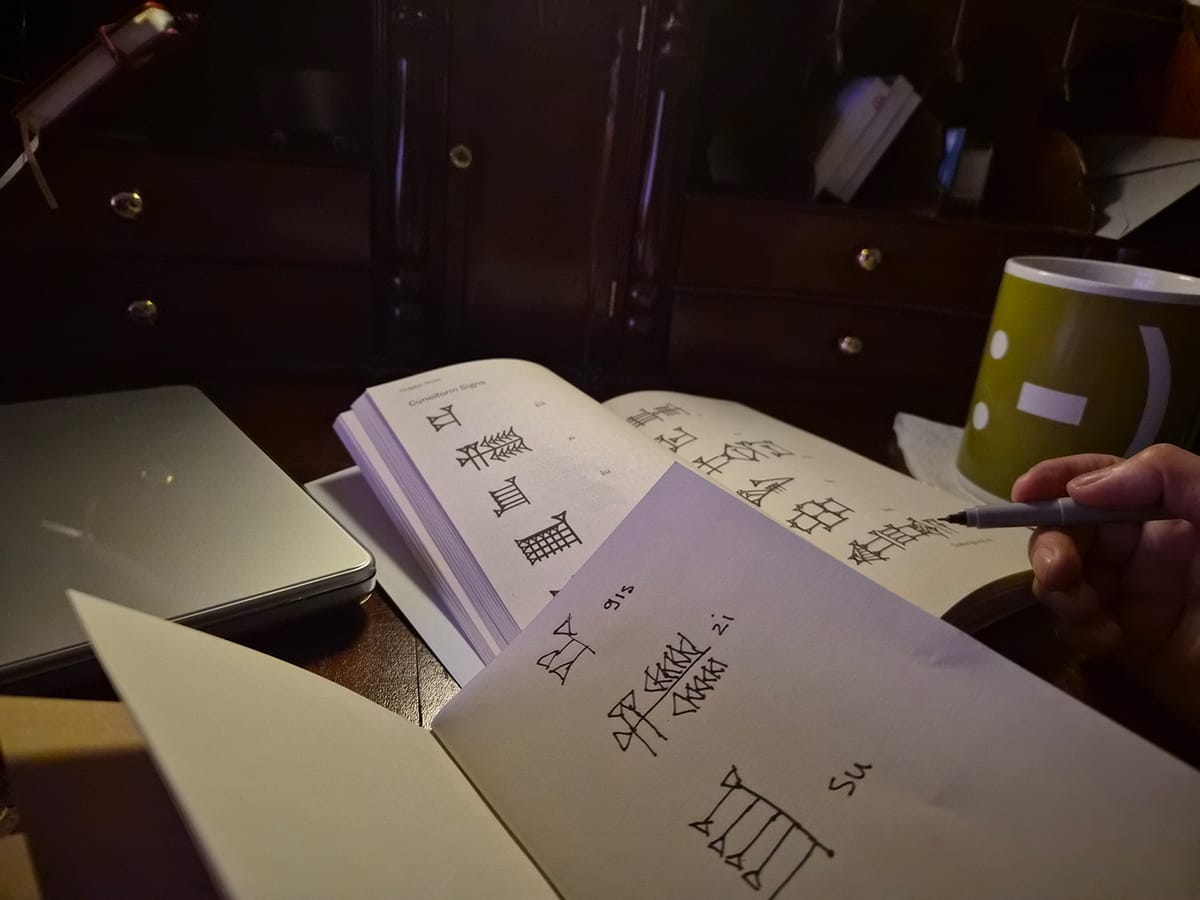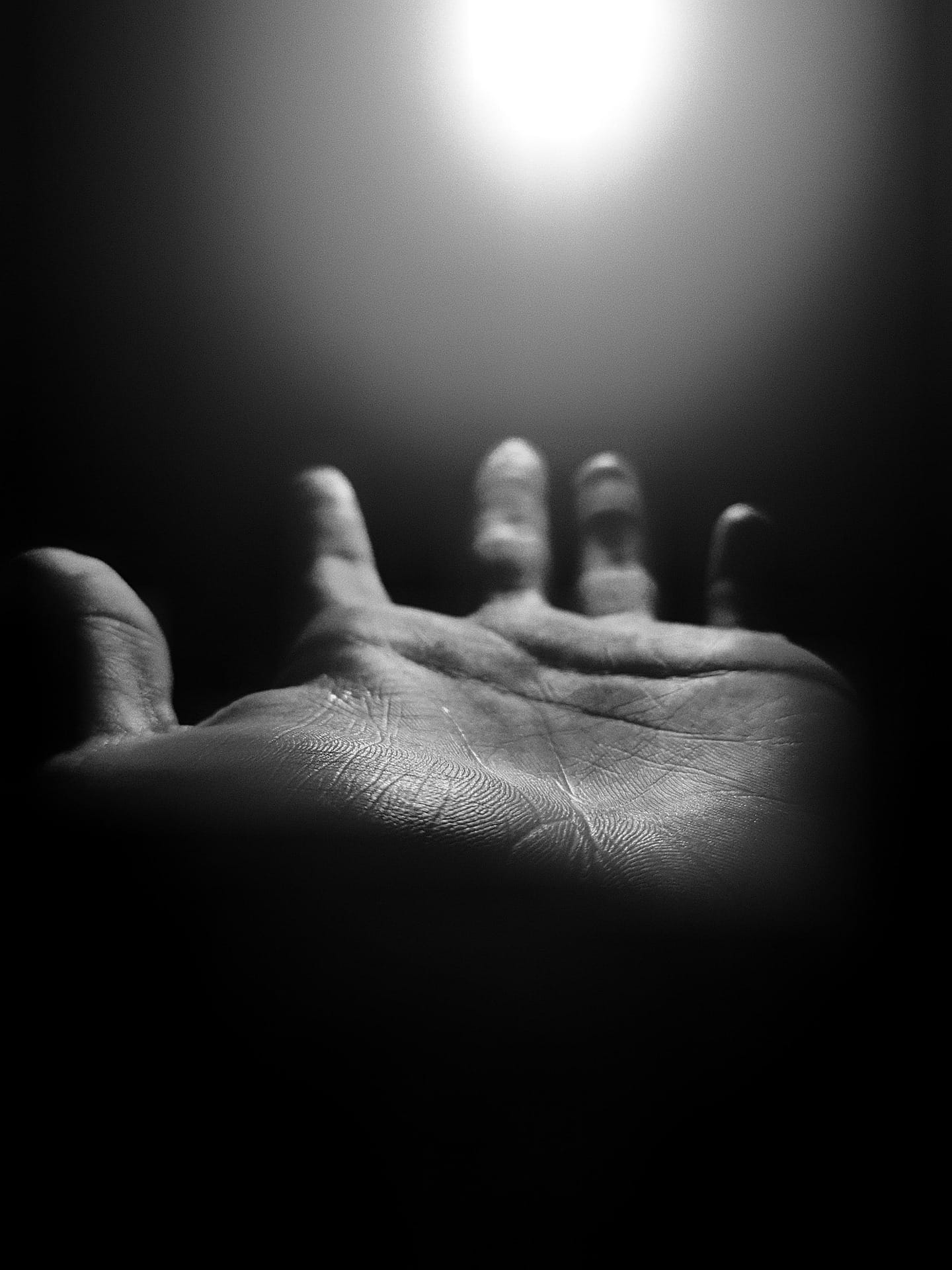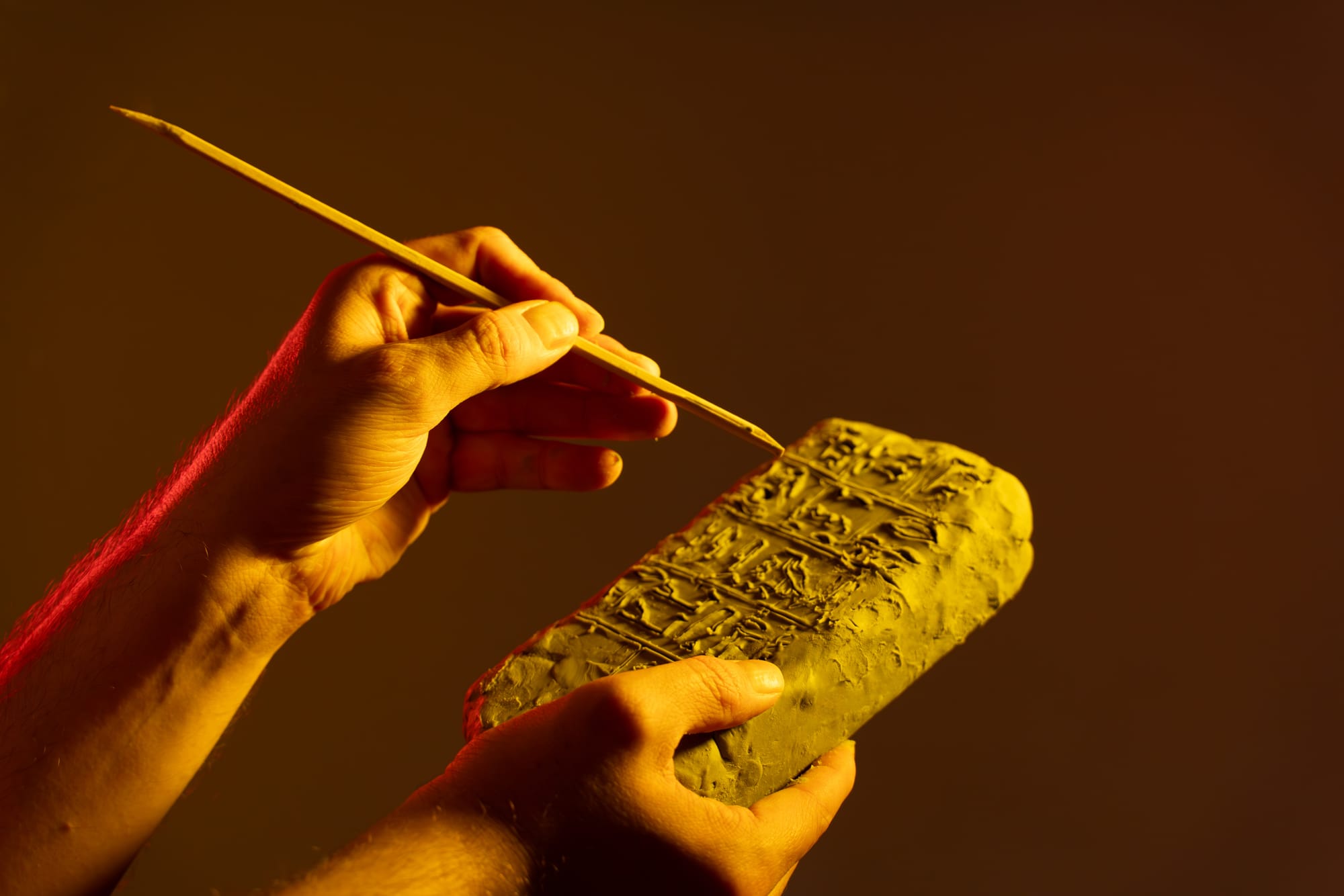Why I’m Learning Sumerian, and What It Taught Me About Hard Work, Burnout, and the Joy of Doing Useless Things
After burning out on a massive project, I started learning Sumerian, a language no one’s spoken in 4,000 years. What began as a useless obsession turned into a lesson on meaning, burnout, and the quiet joy of doing hard things that don’t need to matter.

It's 5:43 a.m.
The desk lamp hums softly. The house is still. The old wooden floor creaks beneath me as I shift in my chair. The air is cold against my feet.
I stare at the page in my notebook, at the mystifying symbols I've been trying to memorize. Sumerian, written in cuneiform, was humanity's first writing system. A language that hasn't been spoken in four thousand years.
The same question circles again: Why am I doing this?
Why am I trying to learn Sumerian, a language that hasn't been spoken for five thousand years? It was written in wedges on clay tablets. There is no practical reason for me to learn it. No career benefit, no secret project.
The honest answer is that one year ago, I would have called this insane.
That same year, a project nearly broke me
The Project That Broke Me and What It Taught Me About Burnout
When Purpose Turns to Ash
Last year, I built a B2B web portal, which included a shipping-cost algorithm for a client who refused to use off-the-shelf software. "We want something more accurate”, they said. I took it as a challenge.
What followed were months of late nights buried in shipping logistics algorithms, academic papers, and a PhD thesis by a naval expert. I became obsessed with how to pack boxes efficiently, how weight and volume interact, and how to squeeze margins from millimeters. I dreamed in cubic centimeters.
It worked. The system calculated shipping costs with uncanny precision, often better than manual calculations. I was proud, genuinely, deeply proud. It was one of those rare moments where obsession and skill aligned to create something elegant.
Two weeks before launch, they pulled the plug.
A quiet email chain. A strategic pivot. A polite "thank you for your work." The solution wasn't the problem; the business direction had changed. I was compensated. Professionally, everything was fine.
It hit me like a gut punch.
I was not exhausted (I was used to that), but because I'd tied my identity so tightly to the outcome, when it evaporated, I felt like I'd evaporated with it.
The thing I'd poured every ounce of focus into was suddenly meaningless. Not flawed. Not rejected. Just... irrelevant.
The Difference Between Exhaustion and Disillusionment
That's when I learned the difference between burnout and disillusionment. Burnout drains your body; disillusionment erases your purpose. You can recover from exhaustion with rest, but you need something else entirely to recover from meaninglessness.
Hard but Harmless: Relearning How to Work Without Breaking
I realized that if I was going to keep doing hard things, and I am wired that way, they needed to be hard in a different sense.
Hard, but harmless.
Hard, but mine.
I'd always been drawn to ancient things. Years ago, I stumbled across an image online: a Sumerian clay tablet covered in tiny wedge-shaped marks. It looked almost primitive, like someone had poked a stick into wet clay over and over. But those marks were humanity's first writing; the first shopping lists, the first love poems, the beginning of recorded thought.
I remember thinking: I want to learn this.
![Sumerian clay tablet, currently housed in the Oriental Institute at the University of Chicago, inscribed with the text of the poem Inanna and Ebih by the priestess Enheduanna, the first author whose name is known[7]](https://mindthenerd.com/content/images/2025/11/1658px-Tablet_describing_goddess_Inanna-s_battle_with_the_mountain_Ebih-_Sumerian_-_Oriental_Institute_Museum-_University_of_Chicago_-_DSC.jpg)
Not because it would help me professionally or impress anyone. But because the idea of decoding symbols pressed into clay five thousand years ago felt like touching something fundamental, standing at the origin point of everything that led to this keyboard I'm typing on now.
So, one quiet morning, I began.
What Learning a Dead Language Taught Me About the Living
Inside the Ancient Code of Cuneiform
Sumerian doesn't make it easy. The script has over six hundred signs, many nearly identical. One symbol can mean different sounds or concepts depending on context. There's no pronunciation guide, no Duolingo owl reminding you, “Your streak is in danger!”
You're essentially doing linguistic archaeology, piecing together meaning from fragments and academic consensus that shifts every few decades.
Slow Progress and the Beauty of Futility
Some days, I spend twenty minutes figuring out which direction to read. Other days, I recognize the sign for "water" without checking my notes and feel absurdly triumphant.
It's frustrating. Slow. Sometimes boring.
And I love it.
Not because I'm making fast progress (I'm not), not because I'll ever be fluent (I won't), but because, for the first time in years, I'm doing something difficult that can't disappoint me.
No client can cancel it.
No deadline can ruin it.
The only failure would be to stop.
And that changes everything.
Enjoying the journey so far?
If you like deep dives into creative chaos, productivity under pressure, and nerdy lessons from real-life experiments, subscribe to get future posts delivered right to your inbox. Subscribe Now
Learning to Tolerate Irrelevance

I used to believe the value of hard work came from achievement, the finished product, the shipped code, the delivered result. The B2B project shattered that illusion. You can do everything right and still have it mean nothing. Outcomes are fragile.
Learning Sumerian teaches a different lesson: The real skill isn't tolerance for difficulty; it's tolerance for effort that produces nothing, proves nothing, and impresses no one.
Practicing Effort Without Expectation
Each morning, I sit down to symbols I don't understand and practice staying uncomfortable. I'm not building toward a launch. I'm not proving anything to anyone. I'm learning for no reason that would satisfy a performance review or justify a line item in a budget.
And somewhere in that ritual, something shifts. The anxiety about whether this "matters" starts to fade, and the need for external validation loosens its grip.
I'm rediscovering what it feels like to care about something without needing it to become anything else.
Relearning How to Care Again
That last one matters more than I expected. After you've burned out on something meaningful, the scariest thing isn't trying again, it's caring again. It's letting yourself become invested in something new when the last thing you invested in turned to ash.
Starting with something that can't disappoint you is perfect training for caring about things that can.
Why Irrelevance Works: The Psychological Architecture of Pointless Effort
There's a reason this works, and it's not just about "finding balance" or "self-care."
It works because it attacks the problem that causes disillusionment: the belief that effort only has value if something comes from it.
Here's the trap: Modern work operates on a simple transaction. You work hard, produce something, and get validation (money, promotion, recognition, impact).
This seems rational. It works fine until the day the outcome disappears and you realize you've completely outsourced your sense of competence to external validation.
The B2B project didn't just fail; it revealed that I could not know if my effort mattered unless someone else told me.
Separating Effort from Outcome
Pointless difficulty fixes this in two specific ways:
First, it separates effort from outcome. Every morning, I practice cuneiform, I'm building evidence that I can do something difficult without it needing to "become" anything. I'm reconditioning myself to tolerate effort that produces nothing measurable. This isn't meditation, it's exposure therapy for achievement addiction.
Rebuilding Internal Measurement
Second, it reinstates internal measurement. When no one can tell you if you're succeeding, you must decide for yourself. Did I understand more today than yesterday? Did I stay curious when I wanted to quit? You're rebuilding the atrophied muscle of judging your own work.
Here's the shift: The Sumerian tablets aren't inherently meaningful; I'm choosing to make them meaningful by caring about them. Once you see this clearly, you realize the B2B project wasn't meaningful because it was useful. It was meaningful because I decided it was meaningful. And when external circumstances changed, I let those circumstances erase that decision.
Learning something useless teaches you that you create meaning; you don't wait for it to be granted.
Why Balance and Hobbies Often Fail
This is why telling burned-out people to "find work-life balance" or "pursue hobbies" often fails.
A hobby you do to decompress from real work is still part of the transaction. You're resting so that you can perform better.
What I needed wasn't balance. It was something I could do without needing to justify why.
The Joy of Pointless Difficulty
Let's be honest: I'm not going to become a Sumerologist. I won't translate previously unknown tablets or contribute to academic discourse. In six months, I might get bored and move on to something else equally strange.
And that's fine.
Because the point isn't to master Sumerian. It's remembering that not every pursuit needs external justification.
When Curiosity Becomes the Reward
For years, my world was algorithms and business logic, a realm where efficiency was the only virtue. Because of that, I instinctively applied that same engineered mindset when I recently began blogging and storytelling. I immediately strategized, branded, and optimized, treating human connection like a system to be solved. I was on the verge of turning this new creative space into another productivity puzzle, nearly forgetting a valuable lesson: that some things are worth doing for the texture of the experience, not the outcome.
Why Not Everything Has to Scale
Learning Sumerian won't boost my income. I can't list 'cuneiform literacy' on LinkedIn, and the ancient Sumerians aren't hiring.
And yet, something about decoding a 4,000-year-old proverb about beer makes me feel alive in a way that optimizing conversion rates never did.
The ancient Sumerians likely didn't think they were creating civilization's foundation. They were recording grain deliveries. Yet they pressed each wedge carefully, as if the act itself mattered.
Five thousand years later, I'm tracing those same marks.
Not every hard thing needs to have a point. Sometimes the hard thing is the point.
Find Your Own Cuneiform

I strongly recommend finding your version of cuneiform if you're stuck, burned out, or hollowed by work that once mattered. Something difficult for no good reason, something that reminds you that effort doesn't always need validation.
Rediscovering Curiosity After Burnout
It could be painting badly, basket weaving, learning Morse code, or building something no one needs.
Doing Hard Things for No Reason at All
Because sometimes the hardest thing isn't doing the work.
It's remembering that you're allowed to do it, simply because you're curious.
Even if no one else understands why.
Stay curious.
Stay nerdy.
Go press your own wedges into some clay!
Note: This essay shares my own reflections on burnout, purpose, and the strange joy of doing something for no reason at all. It’s not professional advice or a blueprint for everyone’s path. If you’re struggling with burn-out,chronic stress, depression, or questions about your mental well-being, please reach out to a qualified professional. My only intention is to offer perspective, a reminder that slowing down, getting lost, and doing something beautifully useless can sometimes be the most meaningful thing you do for yourself.
If you like deep dives into creative chaos, productivity under pressure, and nerdy lessons from real-life experiments, subscribe to get future posts delivered right to your inbox. Subscribe Now